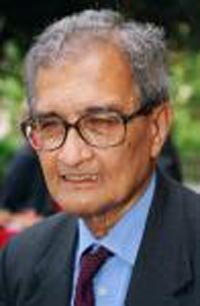
Amartya Kumar Sen born November 3, 1933 is a economist best known for his work on famine, human development theory, welfare economics, and the underlying mechanisms of poverty. He received Noble Prize for his work in mathematical economics in 1998 and the Bharat Ratna in 1999. Sen first studied in India before moving to Trinity College, Cambridge, where he earned a BA in 1956 and then a Ph.D. in 1959. He has taught economics at Calcutta, Delhi, Oxford, Harvard and was Master of Trinity College, Cambridge, between 1997 and 2004. In January 2004 Sen returned to Harvard, where he currently teaches.
Sen’s seminal papers in the late sixties and early seventies helped define the emerging field of Social Choice. The theory of Social Choice first came to prominence in the work by the American economist Ken Arrow, who, while working in the fifties at the RAND Corporation, famously proved that all voting rules, be they majority voting or two thirds-majority or status quo, must inevitably conflict some basic democratic norm. Sen’s contribution to the literature was to show under what conditions Arrow’s Impossibility Theorem would indeed come to pass as well as to extend and enrich the field of Social Choice, informed by his interests in history of economic thought and philosophy.
Sen’s best-known work is his 1981 volume Poverty and Famines: An Essay on Entitlement and Deprivation, in which he demonstrated that famine occurs not from a lack of food, but from inequalities built into mechanisms for distributing food. In addition to his important work on the causes of famines, Sen’s work in the field of development economics has had considerable influence in the formulation of the Human Development Report, published by the United Nations Development Program. This annual publication that ranks countries on a variety of economic and social indicators owes much to the contributions by Sen among other social choice theorists in the area of economic measurement of poverty and inequality.
Sen’s revolutionary contribution to development economics and social indicators is the concept of ‘capability.’ Realizing that top-down development will always trump human rights as long as the definition of terms remains in doubt. Sen argues that governments should be measured against the concrete capabilities of their citizens. For instance, in the United States citizens have a constitutional ‘right’ to vote. To Sen, this concept is fairly empty. He would ask whether all the requisite conditions are met so that the citizen has the capability to vote. These conditions can range from the very broad, such as the availability of education, to the very specific, such as transportation to the polls. Only when such barriers are removed can the citizen truly be said to act out of personal choice. It is up to the individual society to make the list of minimum capabilities guaranteed by that society.
Sen was a ground-breaker among late twentieth-century economists in his insistence on asking questions of value, long removed from ‘serious’ economic consideration. He mounted one of the few major challenges to the economic model that posited self-interest as the prime motivating factor of human activity. While his ‘school’ remains in a minority, there is no question that his work helped to re-prioritize a significant sector of economists and development workers, even the policies of the United Nations.

